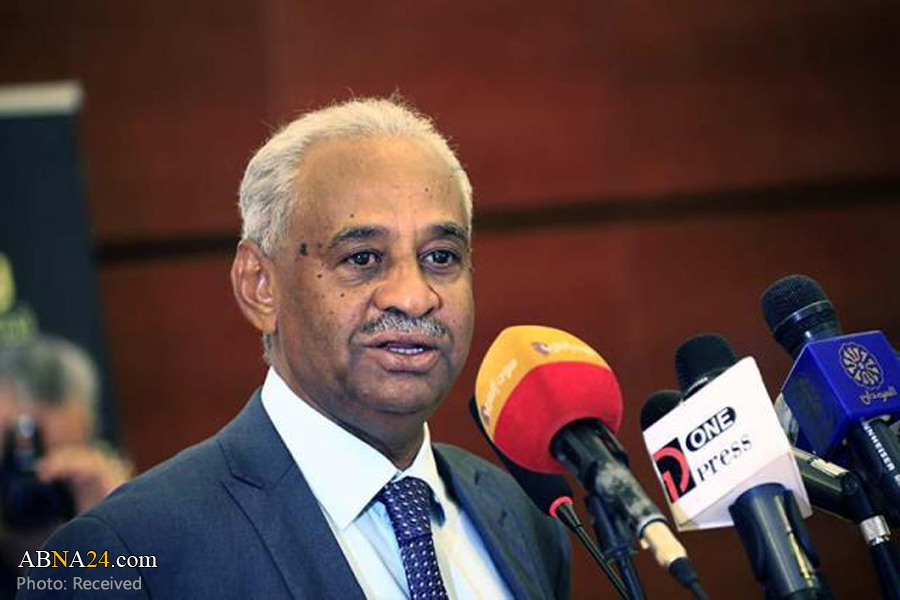AhlulBayt News Agency (ABNA): US President Donald Trump placed Sudan under “heavy pressure” to normalize relations with the occupying regime of Israel and sought to use the normalization deal as a card in his favor during the US presidential election on November 3, a Sudanese government minister told Press TV.
Sudan’s Minister of Information Faisal Mohamed Saleh made the revelation in an exclusive interview with Press TV’s correspondent in the Sudanese capital of Khartoum, Ahmed Kaballo, on Monday.
Trump announced at the White House in October that Sudan and Israel had agreed to normalize relations. Sudan thus became the third Arab country — after the United Arab Emirates (UAE) and Bahrain — to agree to a normalization deal with Israel since August.
But no signing ceremony has been held between Sudan and Israel so far.
Sudan’s Acting Foreign Minister Omar Gamareldin has said the accord would depend on approval from its yet-to-be formed legislative council under a power-sharing deal between the country’s military and civilian leaders.
The US has promised to remove Sudan from Washington’s list of so-called state sponsors of terrorism (SST). That has widely been seen as the sole incentive for Sudan’s normalization with the Israeli regime.
“In the last few months, the question of normalization with Israel was raised and that was not raised only with Sudan, as you may see, with Emirates, Bahrain, and other countries. And we insisted on two things, the separation of the two issues. We used to say to them, and that was said to US Secretary of State [Mike] Pompeo when he came to Sudan, that these are two separate issues, delisting Sudan from SST, [which] we are negotiating on that for 17 or 18 months, and normalization with Israel, that is a very controversial issue,” Saleh told Press TV on Monday.
“Our response to him (Trump) was that we are a transitional government and this issue is not one of our mandate… This should be left to an elected government to discuss… Then, the American pressure on Sudan started…,” the Sudanese minister said.
“He (Trump) used to raise the issues until maybe the last two weeks before the American election, and I think Sudan was used as a card in the election,” he added.
Trump had been attempting to use the normalization deals as foreign policy achievements in the run-up to the November election. Both Israeli and US officials had repeatedly hinted since August that other Arab countries would follow suit.
Trump was declared the loser of the presidential election.
The Sudanese minister went on to say that, “Trump wanted to have some cards in his favor. Part of it was convincing some Arab countries to normalize relationship with Israel. So it was linked directly, Sudan was put under very heavy pressure.”
“It was said clearly this is linked, [that] ‘if you want Sudan to be delisted from the SST, then you have to normalize relationship with Israel.’ It was a very difficult situation,” he added.
Defending his country against the illegal sanctions by the US administration, Saleh said, “Sudanese people have nothing to do with terrorism and that was an act of our state government and it is not fair. The Sudanese people should continue paying the price of that because the old regime hated Sudanese people more than they hated the Americans or the people of other countries. So we shouldn’t pay the price twice, we have paid the price for 30 years.”
Sudan was put on the so-called terrorism list in 1993 over allegations that its ousted ruler, Omar al-Bashir, was supporting terrorism. Under Bashir, Sudan was an enemy of the Israeli regime.
Sudan’s inclusion on the list has made it difficult for the transitional government to access debt relief.
All Palestinian officials have roundly condemned the normalization deals as betrayals of their cause.
.........................................
End/ 257
source : FNA
Wednesday
18 November 2020
10:01:58 AM
1087209

US President Donald Trump placed Sudan under “heavy pressure” to normalize relations with the occupying regime of Israel and sought to use the normalization deal as a card in his favor during the US presidential election on November 3, a Sudanese government minister told Press TV.
